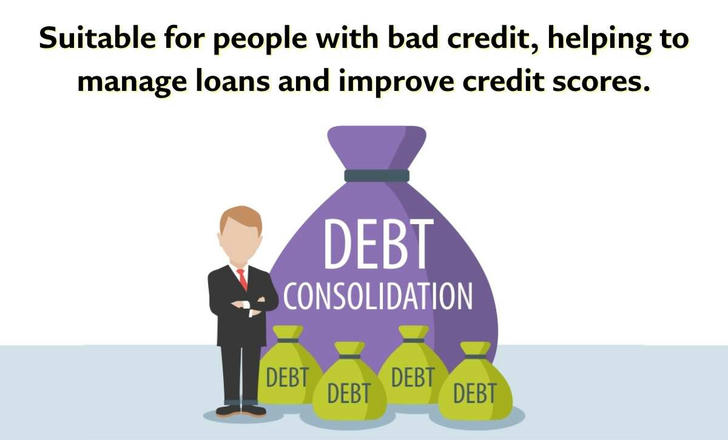🧾 Debt Consolidation in the U.S.: A Practical Guide for Managing Multiple Debts (2025)
Struggling with high-interest credit card bills or overdue payments? Debt consolidation loans can help combine multiple debts into one manageable monthly payment—even for those with poor credit. With the right lender, it's possible to lower interest costs, avoid missed payments, and start rebuilding your credit score over time.

🔍 What Is Debt Consolidation?
Debt consolidation refers to the process of taking out a new loan to pay off several existing debts. Instead of managing multiple payments, interest rates, and due dates, borrowers make one monthly payment, often with a more manageable interest rate or term.
✅ Key Benefits of Debt Consolidation
• Lower Interest Rate: New loan may carry a lower rate than high-interest credit cards
• Simplified Repayment: One monthly payment reduces the chance of late or missed payments
• Credit Score Improvement Potential: On-time repayment can gradually rebuild FICO scores
• Reduced Stress: Fewer bills and phone calls from creditors
💼 Who Can Apply?
Debt consolidation loans are available through banks, credit unions, and online lenders. Eligibility varies but typically includes:
• A steady source of income
• Debt-to-income (DTI) ratio under 50%
• Credit score of 620 or higher preferred — but options exist for those under 600
• U.S. residency and age 18+
📉 Can People with Bad Credit Qualify?
Yes — but with caveats.
| Detail | Explanation |
|---|---|
| Credit Score <600 | Some lenders still offer loans, though interest rates may be 18%–36% |
| Recommended Platforms | OneMain Financial, Avant, LendingPoint, local credit unions |
| Use of Collateral | Secured loans (e.g., car title or savings) may offer better approval odds |
| Soft Pull Options | Sites like LendingTree allow prequalification without affecting credit score |
Note: Debt consolidation is not the same as debt settlement—borrowers are still expected to repay full amounts, not negotiate partial forgiveness.
🧭 Common Types of Debt Consolidation
Personal Loan: Fixed interest, set term, no collateral required
Balance Transfer Credit Card: Introductory 0% APR, usually for 12–18 months
Home Equity Loan: Lower interest, but involves risk of losing home if payments are missed
401(k) Loan: Borrow against retirement funds, but affects long-term savings
Debt Management Plan: Managed by a credit counselor, not a loan but offers consolidated payments
💳 Debt Consolidation Loan Platform Comparison (2025)
| Platform Name | Suitable For | Loan Amount Range | Soft Pull Available | Key Notes |
|---|---|---|---|---|
| Upstart | New-to-credit borrowers | $1,000 – $50,000 | ✅ | Considers education and future income potential |
| Avant | Mid-credit applicants | $1,000 – $50,000 | ✅ | Easy qualification, moderate-sized loans |
| LendingClub | Salaried with average credit | $1,000 – $50,000 | ✅ | Joint loans available, credit card payoff support |
| SoFi | High-credit professionals | $5,000 – $100,000 | ✅ | Includes job-loss protection, no joint signers |
| Upgrade | All credit levels | $1,000 – $50,000 | ✅ | Direct debt payoff option, broad eligibility |
⚠️ Important Reminders
• Always compare total interest paid, not just the monthly payment
• Watch for origination fees, prepayment penalties, and hidden charges
• Use only reputable lenders registered in your state
🙋♀️ Frequently Asked Questions (FAQ)
Q: Will consolidation hurt my credit score?
A: Applying for a new loan triggers a hard inquiry, which may reduce your score slightly. However, consistent repayment can boost your score over time.
Q: Can I get a debt consolidation loan with bad credit?
Yes, many lenders specialize in loans for people with bad credit. Approval depends on income, debt-to-income ratio, and credit history. Secured loans or co-signers can improve chances of approval.
Q: Is it better to use a balance transfer or a personal loan?
A: Depends on your debt size and repayment speed. For < $5,000 debt and strong credit, balance transfer cards are effective. For larger or long-term debts, personal loans are better.
✅ Final Thoughts
Debt consolidation is not a one-size-fits-all solution, but it can be a powerful step toward financial stability when used responsibly. Whether facing mounting credit card bills, multiple loan repayments, or struggling with medical debt, exploring your options could make a significant difference—regardless of age or credit score.
